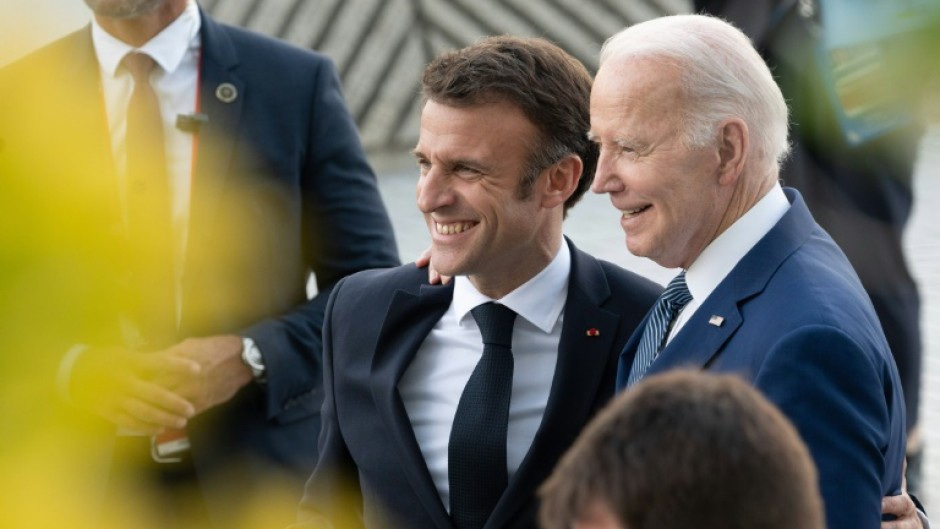President Emmanuel Macron will host Joe Biden next week for the US leader's first state visit to France after both men attend commemorations for the World War II D-Day landings, with talks set to grapple with Ukraine, the Middle East and trade.
Biden's visit on June 8 in Paris will come after the June 6 ceremony in Normandy marking 80 years since the D-Day landings. In a separate statement, the White House said Biden would be in France from June 5 to June 9.
About a million people are expected to attend the D-Day commemorations in France, including King Charles III and Ukrainian President Volodymyr Zelensky. All in all, about 25 heads of government or state are expected to attend.
With Russia's war against Ukraine in its third year, Biden and Macron are expected to discuss further Western support for Kyiv on the sidelines of the D-Day ceremonies and during Biden's state visit.
- 'Defending freedom and democracy' -
The high-profile events will provide both Biden, 81, and Macron, 46, with an opportunity to burnish their image with voters.
Macron's camp faces an uphill struggle to narrow a gap with the far right before France votes in European Parliament elections on June 9.
Biden is campaigning for re-election against Donald Trump, seeking to return to the White House in the November presidential ballot.
On June 6, Biden will speak and participate in ceremonies with his wife Jill Biden to commemorate the 80th anniversary of the Allied landings in Normandy, "which paved the way for the liberation of France and Europe", the White House said in the statement.
"Seventy-three thousand brave Americans landed at Utah and Omaha beaches in Normandy on June 6, 1944, and the president will greet American veterans and their family members while in France to honour their sacrifice," the statement added.
On June 7, Biden will give a speech at Pointe du Hoc, a clifftop promontory whose German bunkers were attacked by US troops in a daring assault during the landings, "about the importance of defending freedom and democracy", the White House said.
The state visit on June 8 will "reflect the enduring and comprehensive relationship between the United States and France, our oldest ally, founded on shared democratic values, economic ties, and defence and security cooperation."
The two presidents will discuss a wide range of "global challenges" such as the Gaza war, Washington said.
Macron's office said for its part that the two leaders would discuss "unfailing and long-term support" for Ukraine.
Ukraine's Zelensky is expected to lobby Western leaders for more assistance, including permission to allow Kyiv to strike Russia using Western-supplied longer-range weapons.
While Macron said Kyiv should be allowed to "neutralise" Russian military bases used to fire missiles into Ukraine, the United States has been reluctant to permit Ukraine to strike over the border out of fear it could drag Washington closer to direct conflict with Moscow.
- 'Exceptional force' -
France will deploy an "exceptional force" of 43,000 police, gendarmes, firefighters and troops to provide security at the D-Day ceremonies from June 5 to June 7, Interior Minister Gerald Darmanin said Thursday.
Nearly a million people are expected to attend around thirty ceremonies organised over the three days in Brittany and Normandy in northwest France.
"This is the biggest commemorative event in our history," Darmanin told reporters.
The main ceremony will take place on June 6 near Omaha Beach, where 12,000 police officers and gendarmes will be deployed, he said.
A mine-clearing operation will involve 80 bomb disposal experts, including 16 divers.
Representatives of Russia -- but not President Vladimir Putin -- have been invited to attend the D-Day celebrations to "honour the importance of the commitment and sacrifices of the Soviet people", organisers said.
Putin has become a virtual pariah in the West after invading Ukraine in February 2022.

